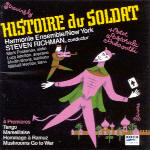For Stravinsky completists this is a release full of pleasant surprises, a sweep of the master’s studio floor for rarities. The homework was done and done well: there is indeed some unreleased material, and it’s good! The pieces are all short, ranging from the terse-but-playful 35-second fanfare that opens the disc to the 25-minute suite from The Soldier’s Tale that closes it. As such, the works never wear out their welcome. The Lied ohne Name for two bassoons is an exercise in slow understatement, and the Tango and the Marseillaise arrangement (both premieres) show the composer’s ability to take found objects (be they a found style or his own arrangement of existing music) and make them his own. The other two “new” pieces, the Petit Ramusianum Harmonique and How the Mushrooms Went to War, are both charming and well made, and quite different from each other. In the latter, we get a glimpse of a very young composer’s understanding of the prevailing musical style of his own time. If not immediately recognizable as Stravinsky, it at least demonstrates his capacity to write singing melody (and, in certain ways, to imitate Rimsky-Korsakov, his beloved teacher). This is a nice addition to this composer’s sadly spare catalogue of music for piano and voice.
The now familiar Octet for wind instruments is so well played here that the disc is worth owning for the performance of this work alone–especially the fantastic and incisive flute of Judith Menenhall and Robert Yamins’ rich clarinet. Lucy Shelton assays one of Stravinsky’s lesser-known masterpieces, Pribaoutki, with grace and an effortless technique: hers is a voice that is quite comfortable in this repertoire, and her Russian sounds, well, Russian. Although the ensemble–expertly led by Steven Richman–plays with exceptional precision throughout, the performers never lose sight of the music’s soul and spirit, allowing for interpretations of both the Octet and the Histoire suite that are faithful to the score but never precious or dry.
































